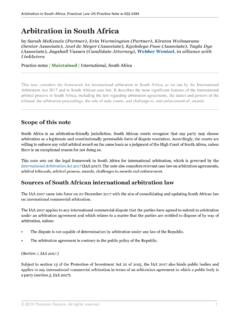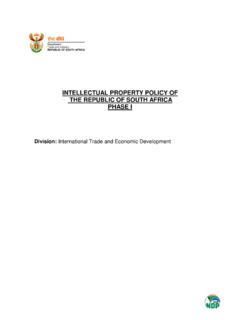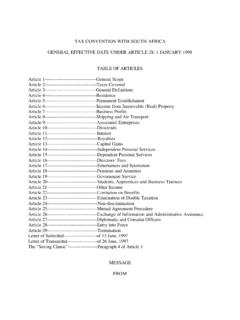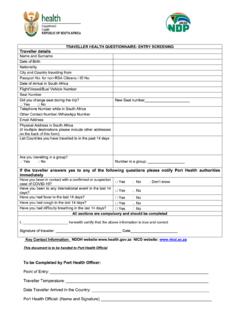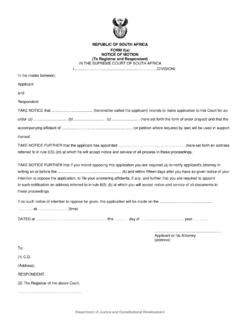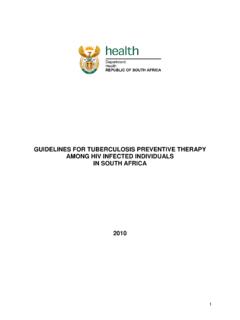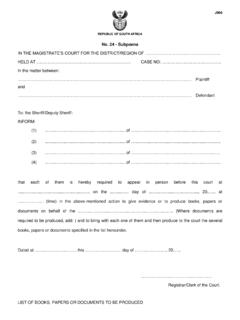Transcription of CONSTITUTION OF THE REPUBLIC OF SOUTH AFRICA, 1996
1 1 Copyright by Sabinet Online CONSTITUTION OF THE REPUBLIC OF SOUTH africa , 1996 (English text signed by the President) [Promulgation Date: 18 December 1996] [Commencement Date: 4 February 1997 unless otherwise indicated] as amended by: CONSTITUTION First Amendment Act of 1997 CONSTITUTION Second Amendment Act of 1998 CONSTITUTION Third Amendment Act of 1998 CONSTITUTION Fourth Amendment Act of 1999 CONSTITUTION Fifth Amendment Act of 1999 CONSTITUTION Sixth Amendment Act of 2001 CONSTITUTION Seventh Amendment Act of 2001 CONSTITUTION Eighth Amendment Act of 2002 CONSTITUTION Ninth Amendment Act of 2002 CONSTITUTION Tenth Amendment Act of 2003 [with effect from 20 March 2003] CONSTITUTION Eleventh Amendment Act of 2003 [with effect from 11 July 2003] [Note: The above-mentioned Amendment Acts have been amended by the Citation of Constitutional Laws Act 5 of 2005] CONSTITUTION Twelfth Amendment Act of 2005 [with effect from 1 March 2006 Proc.]
2 R8 / GG 28568 / 20060227] CONSTITUTION Thirteenth Amendment Act of 2007 [with effect from 14 December 2007] CONSTITUTION Fourteenth Amendment Act of 2008 [with effect from 17 April 2009 Proc. R21 / GG 32130 / 20090416] CONSTITUTION Fifteenth Amendment Act of 2008 [with effect from 17 April 2009 Proc. R22 / GG 32130 / 20090416] CONSTITUTION Sixteenth Amendment Act of 2009 [with effect from 3 April 2009 Proc. R20 / GG 32091 / 20090402] CONSTITUTION Seventeenth Amendment Act of 2013 [with effect from 23 August 2013 Proc. R35 / GG 36774 / 20130822] NOTE: The Act has been amended by section 4 of the CONSTITUTION Second Amendment Act of 1998, by the substitution for the expression Human Rights Commission , wherever it occurs, of the expression SOUTH African Human Rights Commission.
3 2 Copyright by Sabinet Online ACT To introduce a new CONSTITUTION for the REPUBLIC of SOUTH africa and to provide for matters incidental thereto. Preamble We, the people of SOUTH africa , Recognise the injustices of our past; Honour those who suffered for justice and freedom in our land; Respect those who have worked to build and develop our country; and Believe that SOUTH africa belongs to all who live in it, united in our diversity. We therefore, through our freely elected representatives, adopt this CONSTITUTION as the supreme law of the REPUBLIC so as to - Heal the divisions of the past and establish a society based on democratic values, social justice and fundamental human rights; Lay the foundations for a democratic and open society in which government is based on the will of the people and every citizen is equally protected by law; Improve the quality of life of all citizens and free the potential of each person; and Build a united and democratic SOUTH africa able to take its rightful place as a sovereign state in the family of nations.
4 May God protect our people. Nkosi Sikelel iAfrika. Morena boloka setjhaba sa heso. God se n Suid-Afrika. God bless SOUTH africa . Mudzimu fhatutshedza Afurika. Hosi katekisa Afrika. ARRANGEMENT OF SECTIONS CHAPTER 1 FOUNDING PROVISIONS 1. REPUBLIC of SOUTH africa 2. Supremacy of CONSTITUTION 3. Citizenship 4. National anthem 5. National flag 6. Languages CHAPTER 2 BILL OF RIGHTS 7. Rights 8. Application 9. Equality 3 Copyright by Sabinet Online 10. Human dignity 11. Life 12. Freedom and security of the person 13. Slavery, servitude and forced labour 14. Privacy 15. Freedom of religion, belief and opinion 16. Freedom of expression 17. Assembly, demonstration, picket and petition 18. Freedom of association 19. Political rights 20.
5 Citizenship 21. Freedom of movement and residence 22. Freedom of trade, occupation and profession 23. Labour relations 24. Environment 25. Property 26. Housing 27. Health care, food, water and social security 28. Children 29. Education 30. Language and culture 31. Cultural, religious and linguistic communities 32. Access to information 33. Just administrative action 34. Access to courts 35. Arrested, detained and accused persons 36. Limitation of rights 37. States of emergency 38. Enforcement of rights 39. Interpretation of Bill of Rights CHAPTER 3 CO-OPERATIVE GOVERNMENT 40. Government of the REPUBLIC 41. Principles of co-operative government and intergovernmental relations CHAPTER 4 PARLIAMENT 42. Composition of Parliament 43. Legislative authority of the REPUBLIC 44.
6 National legislative authority 45. Joint rules and orders and joint committees 46. Composition and election 47. Membership 4 Copyright by Sabinet Online 48. Oath or affirmation 49. Duration of National Assembly 50. Dissolution of National Assembly before expiry of its term 51. Sittings and recess periods 52. Speaker and Deputy Speaker 53. Decisions 54. Rights of certain Cabinet members and Deputy Ministers in the National Assembly 55. Powers of National Assembly 56. Evidence or information before National Assembly 57. Internal arrangements, proceedings and procedures of National Assembly 58. Privilege 59. Public access to and involvement in National Assembly 60. Composition of National Council 61. Allocation of delegates 62. Permanent delegates 63.
7 Sittings of National Council 64. Chairperson and Deputy Chairpersons 65. Decisions 66. Participation by members of national executive 67. Participation by local government representatives 68. Powers of National Council 69. Evidence or information before National Council 70. Internal arrangements, proceedings and procedures of National Council 71. Privilege 72. Public access to and involvement in National Council 73. All Bills 74. Bills amending the CONSTITUTION 75. Ordinary Bills not affecting provinces 76. Ordinary Bills affecting provinces 77. Money Bills 78. Mediation Committee 79. Assent to Bills 80. Application by members of National Assembly to Constitutional Court 81. Publication of Acts 82. Safekeeping of Acts of Parliament CHAPTER 5 THE PRESIDENT AND NATIONAL EXECUTIVE 83.
8 The President 84. Powers and functions of President 85. Executive authority of the REPUBLIC 86. Election of President 87. Assumption of office by President 88. Term of office of President 89. Removal of President 5 Copyright by Sabinet Online 90. Acting President 91. Cabinet 92. Accountability and responsibilities 93. Deputy Ministers 94. Continuation of Cabinet after elections 95. Oath or affirmation 96. Conduct of Cabinet members and Deputy Ministers 97. Transfer of functions 98. Temporary assignment of functions 99. Assignment of functions 100. National intervention in provincial administration 101. Executive decisions 102. Motions of no confidence CHAPTER 6 PROVINCES 103. Provinces 104. Legislative authority of provinces 105. Composition and election of provincial legislatures 106.
9 Membership 107. Oath or affirmation 108. Duration of provincial legislatures 109. Dissolution of provincial legislatures before expiry of term 110. Sittings and recess periods 111. Speakers and Deputy Speakers 112. Decisions 113. Permanent delegates rights in provincial legislatures 114. Powers of provincial legislatures 115. Evidence or information before provincial legislatures 116. Internal arrangements, proceedings and procedures of provincial legislatures 117. Privilege 118. Public access to and involvement in provincial legislatures 119. Introduction of Bills 120. Money Bills 121. Assent to Bills 122. Application by members to Constitutional Court 123. Publication of provincial Acts 124. Safekeeping of provincial Acts 125. Executive authority of provinces 126.
10 Assignment of functions 127. Powers and functions of Premiers 128. Election of Premiers 129. Assumption of office by Premiers 130. Term of office and removal of Premiers 131. Acting Premiers 6 Copyright by Sabinet Online 132. Executive Councils 133. Accountability and responsibilities 134. Continuation of Executive Councils after elections 135. Oath or affirmation 136. Conduct of members of Executive Councils 137. Transfer of functions 138. Temporary assignment of functions 139. Provincial intervention in local government 140. Executive decisions 141. Motions of no confidence 142. Adoption of provincial constitutions 143. Contents of provincial constitutions 144. Certification of provincial constitutions 145. Signing, publication and safekeeping of provincial constitutions 146.

